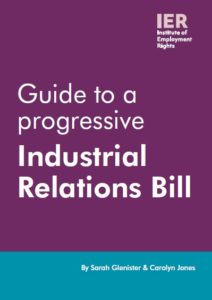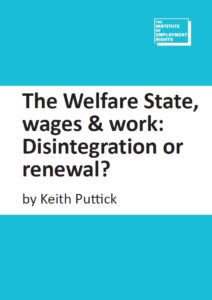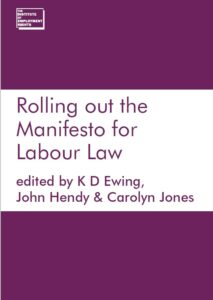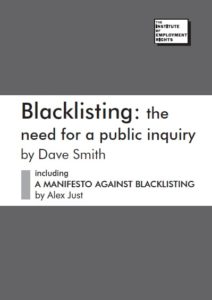
May Day 2021: A new deal for workers
How we should build back better from the pandemic.
Before Covid, a team of experts set out for IER a transformative programme for future work relations in the UK. The aim? To improve the poor working conditions prevalent in the UK pre-Covid, since exposed and made worse by the pandemic.
The 1944 Declaration of Philadelphia (binding on all the countries of the earth) sums it up. Its first proposition is that ‘labour is not a commodity’ (meaning that it is not to be bought and sold on a so-called ‘labour market’). It contains much more, including this statement of objectives:
(a) full employment and the raising of standards of living;
(b) the employment of workers in the occupations in which they can have the satisfaction of giving the fullest measure of their skill and attainments and make their greatest contribution to the common wellbeing;
(c) the provision, as a means to the attainment of this end and under adequate guarantees for all concerned, of facilities for training and the transfer of labour, including migration for employment and settlement;
(d) policies in regard to wages and earnings, hours and other conditions of work calculated to ensure a just share of the fruits of progress to all, and a minimum living wage to all employed and in need of such protection;
(e) the effective recognition of the right of collective bargaining, the cooperation of management and labour in the continuous improvement of productive efficiency, and the collaboration of workers and employers in the preparation and application of social and economic measures;
(f) the extension of social security measures to provide a basic income to all in need of such protection and comprehensive medical care;
(g) adequate protection for the life and health of workers in all occupations;
(h) provision for child welfare and maternity protection;
(i) the provision of adequate nutrition, housing and facilities for recreation and culture;
(j) the assurance of equality of educational and vocational opportunity.
Our laws and practices need to meet these standards, particularly if we are to recover from the recession now enveloping us.
The impact of the pandemic on workers and their rights
| Pre-Covid conditions | Covid impact |
|---|---|
|
|
Our recommendations
-
Jobs that are better, more fulfilling, sustainable and create a green economy
The need for a transformation of our working lives is obvious. The first requirement is, of course, more jobs – jobs that are better, more fulfilling, sustainable and create a green economy to make the UK and the world a better place to live.
More jobs is one aspect of a buoyant economy, one which depends on what economists call ‘demand’, i.e. more wages for people to spend, stimulating the production of more goods and services. The other element is higher wages. Increased wages mean a higher tax take and lower expenditure of benefits which subsidise low wages. That enables more to be spent on public services and investing in infrastructure for the benefit of all. Most people earn around or less than the average wage and they spend their wages – unlike the rich who invest, often in untaxed offshore tax havens. So, increasing wages for lower earners is crucial.
-
A new deal
We need a New Deal at Work to cure the blatant injustices of working life. Below, we set out the key themes for a New Deal.
The Covid shockwave is not the first and we can learn from the way we dealt with previous events which shook the world: the end of the First World War in 1918; the Depression of the 1930s; the end of the Second World War in 1945; and the financial crisis of 2008.
We certainly need to avoid the errors of the past. The removal of wartime State control of industry after 1918 was disastrous for working people. Likewise, the policy of so-called ‘austerity’ (from which the rich were exempt) and the refusal to invest in infrastructure after 2008 succeeded only in transferring wealth to the rich from the less well-off.
And we do not need short-term economic palliatives like those that Sunak and the Tories now present, accompanied by authoritarian measures to strengthen the police and security services. To which we can add the profits made by the private sector in a public health crisis and the debasement of democracy by cosy relationships between ministers and financiers.
In the UK, the EU and elsewhere in the world, governments have spent huge sums of money in response to Covid (thus demonstrating that there was no justification for the last ten years of austerity). But these have been spent largely on ad hoc measures principally designed to restore things as they were, in particular the power of big business.
Covid has made us realise that we need to reset, not just the national economy but the global economy. International cooperation and solidarity are essential. Covid has brought home just how interlinked are life, health, the economy and the environment across the globe.
-
Tackling inequality
The UK has the second highest level of inequality in the developed world (after the USA). Professors Wilkinson and Pickett have shown that inequality in income and wealth degrades every aspect of life, damaging for everyone, even the rich.
Inequality leads to instability, stress, crime, dissatisfaction and disorder. Professor Sir Michael Marmot has demonstrated that financial inequality affects health and life expectancy on a sliding scale: the poorer you are the more likely you are to suffer bad health and to die younger.
We add that financial inequality goes hand in hand with inequality of power.
The imbalance of power is inherent in the relationship between the worker and the employer. In the workplace, the Covid crisis has torn the illusory but threadbare velvet glove of freedom of contract and social dialogue from the iron fist of employer power. Inequality of income and of power must be reversed.
-
Restoring collective bargaining
In the first place, wages must increase, especially for the lowest half of the wage distribution (i.e for most workers) and this means the reintroduction of sectoral collective bargaining – minimum terms and conditions fixed by negotiation in each industry and sector of the economy. On this foundation, workplace bargaining can be reinvigorated.
Even the OECD now recognises, with the ILO and researchers from the IMF, that extensive collective bargaining is the only realistic means of diminishing inequality (and the threat of instability that growing inequality poses). The most equal and stable societies in the world have high levels of collective bargaining.
Of course, collective bargaining offers other benefits. It increases wages and hence demand in the economy. It prevents employers undercutting each other on labour costs. It increases productivity (the UK has the lowest productivity in western Europe). It gives workers a say in their terms and conditions. And international law requires States to promote collective bargaining.
Collective bargaining is the only way in a capitalist society in which employers’ overwhelming power at work can be constrained and equality of treatment assured. To achieve sectoral collective bargaining, legislation is required and the IER has mapped that out (drawing on a modern version of the old Wages Councils). Redressing the imbalance of power also requires greater legal rights for trade unions in terms of access to workplaces and the right to strike in accordance with international law – not unlimited but freed from much of the current statutory shackles.
In the first place, wages must increase, especially for the lowest half of the wage distribution (i.e for most workers) and this means the reintroduction of sectoral collective bargaining – minimum terms and conditions fixed by negotiation in each industry and sector of the economy. On this foundation, workplace bargaining can be reinvigorated.
Even the OECD now recognises, with the ILO and researchers from the IMF, that extensive collective bargaining is the only realistic means of diminishing inequality (and the threat of instability that growing inequality poses). The most equal and stable societies in the world have high levels of collective bargaining.
Of course, collective bargaining offers other benefits. It increases wages and hence demand in the economy. It prevents employers undercutting each other on labour costs. It increases productivity (the UK has the lowest productivity in western Europe). It gives workers a say in their terms and conditions. And international law requires States to promote collective bargaining.
Collective bargaining is the only way in a capitalist society in which employers’ overwhelming power at work can be constrained and equality of treatment assured. To achieve sectoral collective bargaining, legislation is required and the IER has mapped that out (drawing on a modern version of the old Wages Councils). Redressing the imbalance of power also requires greater legal rights for trade unions in terms of access to workplaces and the right to strike in accordance with international law – not unlimited but freed from much of the current statutory shackles.
-
Overhauling rights at work
Legal reform and a greater role for collective bargaining are also needed to create a modern framework of equality law – which is currently so defective that a significant gender pay gap still exists after 50 years of legislation outlawing it. There is presently no law to redress the ethnicity pay gap so starkly revealed by COVID. As highlighted by the work of the IER, parental leave and pay, time off for carers, adequate State provided child care, the election of ‘equality reps’, are typical of the areas which need to be addressed. The disabled need greater protection.
Individual employment rights, (unfair dismissal, redundancy consultation and pay, whistleblowing, and so on) all need new legislation. Unfair dismissal will be 50 years old next year. Why has it failed to guarantee job security? Many people work too many hours (including the COVID generation of homeworkers), many work insufficient hours to make ends meet, and many are given insufficient notice of changes to shifts, so a new code on hours of work is required by legislation and collective agreement.
The spate of ‘fire and rehire’ tactics (currently estimated by the TUC to affect 9% of workers) focusses attention on a particular feature of inequality: the one-sided nature of the ‘contract of employment’ which (amongst other evils) enables the employer to give notice to dismiss and offer to re-engage on worse terms. This has a long and despicable history since the coal owners used it to cut the wages of the miners in 1921 and again in 1926 leading to the General Strike. Plainly, legislation is now needed to create a statutory form of employment relationship to equalise power at work.
-
Stamping out abuse
We must thus overhaul rights at work to support workers, to contain employer power, and to stamp out abuse. Included in that project is the goal of eliminating zero hours contracts and properly regulating casual work and agency work.
In the same vein, the form of working relationship needs reform so that: either you are an employee with all employment rights from day one; or you are a self-employed professional with your own business, clients and customers. We need to get rid of the array of other statuses, ‘limb (b) workers’, ‘personal service companies’, ‘false-self-employed’ by which employers have sought to deny various rights to workers. Such inequalities need to be ended.
If equality means anything it must also include redressing inequality in health and safety. A publicly-owned and properly funded NHS is a pre-requisite, as is a proper and powerful public health structure. Just as essential is a safety regime at work which reduces the risks of those who are exposed to physical risk of injury or death in so many manual and caring occupations (and in office, driving, shop, hospitality and home-work) and to the risk of disease (as COVID starkly showed), stress and depression.
Our law on health and safety at work is in need of comprehensive revision. We also need radical new techniques of enforcement since the HSE has failed so badly (as the IER and Hazards has recently revealed). That means a new independent and well-funded enforcement authority and greater power for safety reps to stop the job.
Enforcement of other rights, too, is vital if equality is to be achieved. There is no point in having rights to require equal pay for equal work, to recover unpaid wages or to prevent unfair dismissal if those rights cannot realistically be enforced. At the same time unions need greater powers to enforce rights directly, though the new extension of collective bargaining coverage will enable many issues to be progressed through dispute resolution procedures without the engagement of lawyers.
-
Regrowing the State
Inequality of income and wealth is primarily a question of wage levels (though social security and pensions play their parts, of course). But taxation is another lever, what economists call ‘an active fiscal policy’. Covid has shown that government expenditure is not tied to tax revenue. Taxation is not an effective mechanism for ‘levelling up’. But it could be used to level down, for example by really cracking down on tax avoidance and by increasing tax on the wealthy who can spare the most, as with the one-off tax being introduced in Argentina to meet some of the costs of the pandemic, or raising the rate of tax on capital gains to that on income.
Taxation could go some way to deal with the obscene profiteering of companies like Amazon and Serco during the pandemic. So, taxing to level across the board, a commitment to equality, an active tax policy coupled with an active wages policy to raise wages through collective bargaining. This is the way to redistribute wealth.
All these measures require strong State supervision. Of course, in a democracy a sympathetic government or Parliament cannot be guaranteed but we can at least provide a menu for such a future government. First off, it will need to appoint a Secretary of State for Labour (not just for employment rights) with strong powers to impose sectoral collective bargaining in the sectors that need it and to introduce the legislation (as the Welsh are currently proposing) to use the mighty weapon of public procurement to bring employers into line throughout the public contract supply chain (which is a significant part of the UK economy).
The Secretary of State will need to introduce a new Employment Relations Act to implement the proposals outlined above and to create a new independent enforcement regime. Legislation will also be required to re-grow the State by insisting that public services are delivered by the State and reversing outsourcing and privatisation (an evil often compounded by the fact that many of these private sector companies are offshore hedge funds – often in tax havens – with no interest beyond profit in the services they deliver). This would ensure that privatisation and outsourcing do not drive down wages and terms and conditions of employment in the search for profits, one of the prime causes for low pay in this country.
-
Restoring democracy
In the 1970s there was much debate about ‘industrial democracy’ with the Bullock Report recommending workers on boards (as in Germany). Though well received, no agreement on implementation could be reached. Such proposals are needed now and workers having a guaranteed percentage of voting rights in shareholder meetings. The concept of industrial democracy is fundamental to the transformation of the workplace. The exclusion of workers’ input through their unions (or even as individuals) has been striking throughout the pandemic.
The most effective means of promoting industrial democracy is, of course, the reinstatement of sectoral collective bargaining (which in turn supports workplace bargaining).
In this country, the percentage of workers covered by a collective agreement is down to about 25% from over 80% from the Second World War to the 1980s. Driven by government policy and legislative changes it has been in steady decline ever since. In contrast, the European Union appears to have reversed its anti-collective bargaining stance and (in a draft directive on minimum wages) is now concerned about countries where collective bargaining coverage has fallen below 70%! In the UK we now have a democratic deficit where 75% of workers have no say whatever in the fixing of the terms and conditions of employment.
The current outbreak of fire and rehire tactics is a manifestation of the exclusion of workers from any democratic input into the condition of their working lives, other than to ‘take it or leave it’.
But industrial democracy goes further than this. We need to re-institute what is sometimes referred to as ‘the economic constitution’, i.e. a legitimate role and voice for trade unions in the process of government. Again, this is something which we had in the past, but have forgotten about, or are very defensive about, although we are entitled to it. Our voice should be heard in government, in all decisions which affect workers. In other countries unions are integral to setting nationally the annual pay increase parameters (e.g. Norway) or social security and pensions (e.g. France). The modest proposal of the TUC for a National Recovery Council with trade union involvement, was rebuffed by government – though it does not go far enough.
At the moment, the trade union voice is not being heard loudly enough, nor has the trade union programme for the future been sufficiently well developed. We have a responsibility as a movement to develop an agenda which is not only based on the experience of the past, but which is also critical to the future of our children and their children. It is obvious, for example, that the teaching unions should be participants in proposals and decisions which affect the future of education – and the same is true in other industries and sectors.
-
Controlling globalisation
The COVID vaccination programme so obviously needs global co-operation in place of national competition or extortion by big pharma corporations refusing to release vaccines from patent. Only when the bulk of the world’s population is vaccinated will we be free of COVID. Internationalism is vital.
The UK has particularly suffered with one of the highest death tolls from COVID in the world. Our incompetent government failed to heed the lessons of previous pandemic exercises, prepare and ensure adequate supplies of PPE, enforce health and safety law, quarantine arrivals from abroad, provide adequate pay for self-isolating workers, lock-down in a timely manner, put the long-term interests of public health above the short-term interests of private business, or listen to the trade unions.
Only in the matter of securing sufficient vaccine has the UK redeemed itself. Having wasted £37 billion on a failed private test-and-trace effort the government wisely left vaccination to the NHS and thousands of volunteers who acted for the public good, mocking Johnson’s claim for ‘capitalism and greed’.
The economic crisis on the tail of Covid is also a global one. The UK is entering the worst recession of any developed country partly because its failure to deal competently with Covid, partly because of the appalling Brexit deal it struck (Brexit need not have involved non-tariff barriers which have diminished British exports by 40% since January), and partly because of its economic incompetence and failure to plan for the entirely foreseeable recession. Yet it is evident to all that there is a global recession and global measures are necessary to address it and the impending disaster of climate change. It does not need to be said that we must ensure that the current economic disaster does not lead to war as did that in the 1930s.
Now is the time to start regulating globalisation. It is not a natural phenomenon but a creation of governments to allow transnational corporations to exploit the globe in the search for cheap resources, cheap labour, low taxation, low regulation and rich markets. Globalisation has unleashed tremendous private wealth, and is the source of many problems which we now face (we know that the richest 1% of the global population account for more emissions than the poorest 50%). We need to address private wealth and the exploitation of workers facilitated by globalisation.
One action we can take (and press on other countries) is the effective regulation of supply chains (as the French have begun to do). The IER has identified a raft of proposals in this respect.
-
Implementing the rule of law internationally
More than that we need to strengthen the international institutions, most of which were established precisely to avoid global calamities such as world wars. The UN and the International Criminal Court, no doubt, have many faults but they exist, they establish rules and procedures, we nominally endorse them but often ignore them and turn a blind eye to other countries ignoring them.
This is also true of the most important international agency in the field of work, the International Labour Organisation (ILO). This tripartite body (governments, employers and workers), formed in the peace settlement at the end of the First World War and with its most important Conventions and principles laid down at the end of the Second World War, establishes minimum standards for the entire world. The UK has ratified and is bound by most of these international laws (but should ratify more). The rule of law means that we should implement and abide by them.
We need to rediscover the ‘spirit of Philadelphia’. We refer to the ILO’s Declaration of Philadelphia, adopted in 1944. We have been conditioned to talk about minimum wages, adequate wages and living wages as the responsibility of government. The Declaration of Philadelphia speaks instead about the right of workers to a just share of the fruits of progress. That means that we should redistribute wealth on a socially just basis. Wages should not be determined by the market, but by the social value that our work has for the community as a whole.
If we were to allocate pay on the basis of social justice then people working in care homes would be top of the pile, and nurses would not be being told that the country can only offer them a 1% pay increase (in England) after their heroic efforts over the last year. We need to have a way of valuing work other than by the ‘labour market’, and also of ensuring the universal application of these standards of social justice to everyone. For the moment the best mechanism we have towards such ends is collective bargaining: wages and terms and conditions cannot be left in the exclusive hands of government, still less of employers.
Though we have left the EU there are also European Treaties (of the Council of Europe) which continue to bind us and to which our labour law should give effect: the European Convention on Human Rights and the European Social Charter. Both contain the right to bargain collectively, the first by virtue of a judgment of the European Court of Human Rights, the second because it is an explicit provision of the Charter. The Charter also requires States ‘to recognise the right of workers to a remuneration such as will give them and their families a decent standard of living’.
These obligations have been reinforced by the Brexit agreement with the EU. Hard to believe, but both the EU and the UK have renewed their vows to respect ILO Conventions, as well as the European Social Charter. It is time we started to take these obligations seriously as part of a broader campaign for trade union rights globally.
Download the IER new deal for workers document
- New-Deal-2021.pdf - 500.12 KB








